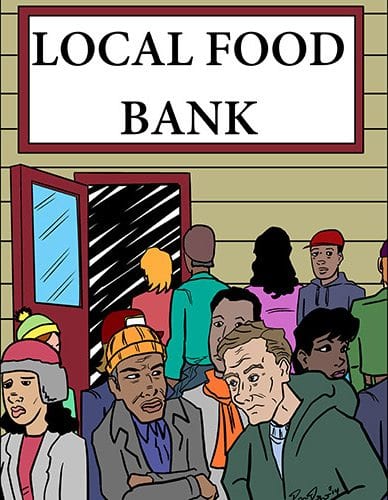
In his State of the Union address on Jan. 8, 1964, President Lyndon Johnson decreed that “this administration today, here and now, declares unconditional war on poverty in America.” In so doing, Johnson confirmed his commitment to a compassionate policy prevalent among many civilized societies.
In ancient times the Old Testament proclaimed that “the wicked in his pride doth persecute the poor” (Psalms 10:2). And in a special criticism of those who enjoy the comfort of wealth without any empathy for those who are less affluent the Bible further admonishes those lacking concern for the poor. “He hath said in his heart, I shall not be moved; for I shall never be in adversity.” (Psalms 10:6).
Now, on the 50th anniversary of Johnson’s declaration of war, the focus of discussion seems to be a conflict between conservatives and progressives. Some of the conservatives insist that anti-poverty programs run by the government have failed. Others more realistically indicate that numerous efforts have produced some positive results. However, the fundamental issue in the American democracy is what responsibility does the government have to provide for the poor.
There is less national consensus on that issue than one might believe. In the recent campaign for U.S. president, Mitt Romney generated substantial opposition among voters with his so-called 47 percent comment at a meeting of millionaire contributors. He said:
“There are 47 percent of the people who will vote for the president [Obama] no matter what … who are dependent upon government, who believe they are victims, who believe the government has a responsibility to care for them, who believe that they are entitled to health care, to food, to housing, to you-name-it. That that’s an entitlement.”
An analysis of the vote indicates that many Americans, even low income whites, find this position acceptable. Many people believe that in America, the land of milk and honey, failure results only from laziness, a lack of commitment or damaging personal habits. An easy way to rebut that premise is to cite the fact that nearly 2 million people declared bankruptcy last year because of an inability to pay medical bills. That is a bigger cause of bankruptcy than defaults on mortgages or credit card debt, according to a report by Nerdwallet Health. Bad things can and do happen to good people.
A specious attack on anti-poverty programs is that they have not worked because poverty has increased from 38.6 million people in 1962 to 49.5 million in 2012. However, the country’s population has actually grown in the intervening years from 184.3 million to 310.7 million. As a result, the percentage in poverty has declined from 21 percent to 15 percent.
It is appropriate and efficient to review anti-poverty programs periodically to determine whether they are cost effective. One of the most successful programs, Social Security, has survived many attacks by conservatives and has greatly reduced poverty among the elderly.
Social Security could provide even greater benefits as proposed by Sen. Elizabeth Warren if a portion of the more than $2 trillion in the trust fund could be invested more aggressively like one of the sovereign funds established by oil-rich Middle Eastern countries. State pension funds like CalPERS ($277 billion) in California and college endowments like Harvard’s ($30 billion) earn a much higher return than Social Security without endangering the private free enterprise system.
Anti-poverty programs that are unsuccessful should be modified or eliminated. Those that work should be expanded or replicated. America is blessed with enormous wealth. There is no moral way that this nation can ignore the plight of citizens who are financially distressed. The New Testament decrees that “to whomever much is given … of [them] will much be required.” (Luke 12:48). The war on poverty must be waged until its strategic goals are attained.


![Banner [Virtual] Art Gallery](https://baystatebanner.com/wp-content/uploads/2024/04/Cagen-Luse_Men-at-store-e1713991226112-150x150.jpg)



